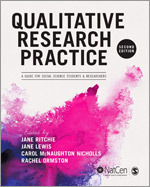Qualitative Research Practice
A Guide for Social Science Students and Researchers
- Jane Ritchie - National Centre for Social Research, London
- Jane Lewis - Colebrooke Centre for Evidence and Implementation
- Carol McNaughton Nicholls - National Centre for Social Research, London
- Rachel Ormston - Scottish Centre for Social Research
Qualitative Research (General) | Social Research Methods | Sociological Research Methods
Written by a team of leading researchers associated with NatCen Social Research (the National Centre for Social Research) this textbook leads students and researchers through the entire process of qualitative research from beginning to end - moving through design, sampling, data collection, analysis and reporting. In this fully revised second edition you will find:
- A practical account of how to carry out qualitative research which recognises a range of current approaches and applications
- A brand new chapter on ethics
- A brand new chapter on observational research
- Updated advice on using software when analysing your qualitative data
- New case studies which illustrate issues you may encounter and how problems have been tackled by other researchers.
Good text for those students wanting to find out more about particular aspects of conducting qualitative research without being overwhelmed. Good examples given to illustrate points and signposts readers to both further reading and online resources.
this will be recommended to any of my students who need to think through issues of when and how qualitiative research (or mixed methods) may be appropriate - which issue are I feel handled clearly
we have copies of this edition in our library
This edition provides answers to most of the How to? questions of early career (and also more seasoned) researchers in qualitative research. I found it very useful and recommend this book as essential reading to my students.
The text provides a broad overview of the essentials of research methodology in the social sciences. As such it is an excellent reference source.
too similar to other books in the field
My sense of this text is that it will assist my counselling students that there is something to be gained from embracing qualitative research as a highly important part of their develipment as professionals. For the past two years there appears to have been something of an uphill struggle in convincing students on our courses that research is not only useful but further it is their obligation as fledgling professionals in a field that is moving inexorably toward full professionalisation. This text, of which I was unaware in it's first edition, presents the reasons for using qualitative methods in a very sensible and pragmatic manner, allowing even the most anti-research oriented student to understand the methods and the reasons for using them. Chapters on each aspect of undertaking qualitative research lead the newbie logically through the whole process and of particular value is the newly added chapter on ethical considerations tackles this particularly important aspect of research process ina non-threatening manner that nonetheless warns the reader of the need for risk management and caution.
A useful guide to research practice for novice researchers
A clear book that gives a good overview of qualitative methods.
This text provides students with a strong appreciation of qualitative research methods. It is insightful, accessible and student friendly in tone.
This is a good basic introduction to methods in qualitative research. It is an interesting title as not all researchers would use the word qualitative to refer to research designs. We tend to use it only to refer to data and use more specific terms for methodologies and designs. The book is good on methods and ethics but I was a bit disappointed by the Foundations chapter - only a very short bit on phenomenology and then on IPA and some of the definitions very brief indeed and could give students the idea that this is all there is to critical realism to take just one example. Having said this I think the book will find a place on reading lists and hopefully will provide a bridge to the work of the NatCen for social research.







